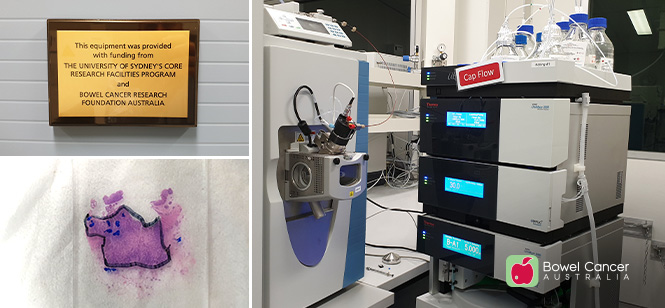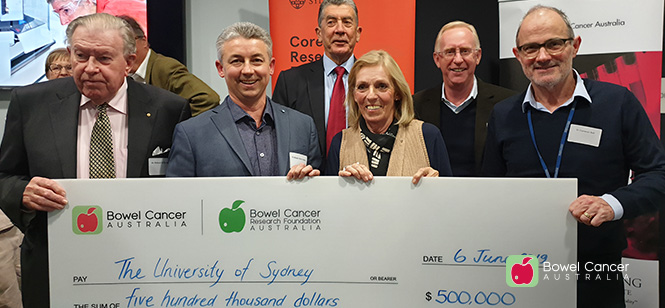In the first week of Bowel Cancer Awareness Month 2019, the University of Sydney officially opened the Kolling Institute node of their Sydney Mass Spectrometry core facility. The facility was made possible with a significant financial gift of $500,000 from Bowel Cancer Australia, established to support the research of the Lawrence Penn Chair of Bowel Cancer Research, Professor Mark Molloy PhD and his research team.
Members of the Bowel Cancer Australia board and guests were in attendance, along with the Deputy Vice-Chancellor (Research), Professor Duncan Ivison and Core Facilities Director, Professor Simon Ringer presiding.
Mass Spectrometry
Professor Molloy’s focus is on molecular analysis, which can improve understanding of tumour biology and help clinicians make decisions about treatment. It is an area of research that could have a profound impact on the care of bowel cancer patients.
“There is no doubt that technology is driving a big revolution in clinical care,” Professor Molloy said.
One example of this technological transformation is the use of mass spectrometers – sophisticated weighing devices that allow researchers to determine the molecular make-up of various substances.
With two new mass spectrometers installed at the Kolling Institute, Professor Molloy and his team will analyse the molecular features of proteins and metabolites in individual tumours, to tailor treatment pathways according to the needs of each patient.
"When combined with genomic analysis, this gives us a more complete molecular picture of bowel cancer, which is essential to better understand prevention and treatment strategies," Professor Molloy said.
Mass spectrometers could also be used to monitor medication levels in a patient’s body, allowing clinicians to deliver a dose precisely calibrated to suit the individual patient.
The goal is to find ways of integrating molecular analysis into everyday patient care. Professor Molloy envisages that within the next five years clinical teams working with bowel cancer patients could include a molecular scientist.
“Today, these multidisciplinary teams discuss imaging, surgery, approaches to chemotherapy and so on,” he said.
“I’d like to see clinicians also asking how molecular analysis could help add to the fuller picture.”

At the opening of the new facility earlier this month, Professor Molloy explained how the two state-of-the-art mass spectrometry instruments would underpin his research team's effort to map the proteome (the proteins) and metabolome (the metabolites) from specimens provided by bowel cancer patients.
“These new mass spectrometers will have a profound impact on the future of patient treatment and care by allowing researchers to more closely examine bowel polyps, precancerous growths that can grow into cancers, to better understand why they develop in some people,” said Professor Molloy.
Professor Molloy demonstrated how the mass spectrometer can map the proteome using a very small amount of bowel cancer on a pathology slide, revealing the instrument’s incredible capabilities in providing biological information compared to older systems.
“This is viewed as a key aspect of understanding the triggers that allow bowel cancers to grow and metastasize to other body locations,” he added.
Research undertaken by the Lawrence Penn Chair of Bowel Cancer Research is aiming to give new information to clinicians that will better inform them of appropriate treatment pathways based on the molecular information encoded in a patient’s polyp or tumour.
The Lawrence Penn Chair continues to emphasise the importance of research to understand ways we can prevent bowel cancer and to lead the way in providing better treatments for bowel cancer patients.

The Lawrence Penn Chair of Bowel Cancer Research
Made possible through a contribution of $6.4 million by Bowel Cancer Australia, the Lawrence Penn Chair of Bowel Cancer Research is named after one of Australia's oldest bowel cancer survivors and is based at the University of Sydney's Northern Clinical School Campus.
An endowed professorial chair is recognised as a University's finest scholar in their field of expertise. They provide a research focal point in the country they are located, helping to attract and retain the brightest researchers and spur colleagues to their finest efforts - benefiting the entire Australian community.
Launched in May 2018, the commencement of Professor Molloy as the Lawrence Penn Chair of Bowel Cancer Research is the culmination of many years of hard work by all concerned and marks the beginning of many more years of valuable, translatable research.
How you can help
Bowel cancer research is expensive.
The proteome analysis of one cancer alone costs $1,400, so please consider making a tax-deductible donation to support Bowel Cancer Australia in finding a cure for bowel cancer.
While Professor Molloy and his team will be researching the causes, prevention and treatment of bowel cancer to benefit us all in the future, Bowel Cancer Australia will continue to be here today - supporting, informing and caring for people affected by the disease.
Proudly 100% community funded, Bowel Cancer Australia relies solely on donations and bequests.






